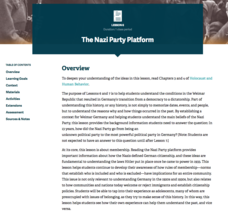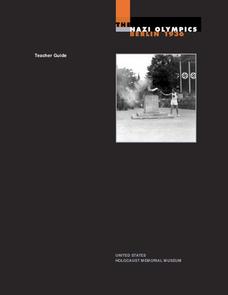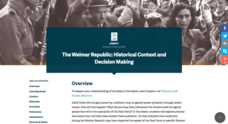US National Archives
Eastern Europe 1939-45 — Stalingrad
Acts of civilian courage in Great Britain—and in one case, the island of Malta—often receive the George Cross, instituted by King George VI at the beginning of World War II. After the valiant defense of Stalingrad by its inhabitants,...
US National Archives
Eastern Europe 1939-45 — Ukraine
Was Joseph Stalin desperate or exaggerating the USSR's need for assistance on the Eastern Front in 1942? History students examine two differing opinions on Stalin's position and the reality of the Eastern Front just three years before...
US National Archives
Eastern Europe 1939-45 — Camps
Britain's decision not to bomb German death camps in World War II has provided many questions for historians, but with a primary source analysis lesson, high school students may be a step closer to finding out the truth. Learners read...
US National Archives
Eastern Europe 1939-45 — Berlin
The inevitability of World War II has arrived: Berlin has fallen. Young historians watch contemporaneous footage of the event, analyze primary source documents, and write a news report that details the roles of the Soviet, British,...
Anne Frank House
Who Was Anne Frank?
Set the stage for a study of The Diary of a Young Girl with a resource that includes background information about Anne Frank's early years, the Nazi invasion of the Netherlands, her Secret Annex hiding place, and her capture and...
US National Archives
WWII: Western Europe 1939-45 – End of the War
You are Winston Churchill, and on May 9th, 1945, you receive millions of grateful cards and telegrams. How do you respond? High schoolers put themselves in the Prime Minister's chair with an activity that prompts them to respond to a...
US National Archives
WWII: Western Europe 1939-45 – Hamburg
Was bombing German cities an effective means to an end, or was it a war crime? Could it be both? Young historians ponder these questions with an activity that prompts them to use primary sources to summarize the debate surrounding RAF...
US National Archives
WWII: Western Europe 1939-45 – Deception and Bluff
World War II left the British desperate for help in any form—including in the form of a magician! High schooler conduct research on Jasper Maskelyne, a stage magician who used his talents to deceive the Germans on the war front, before...
US National Archives
WWII: Western Europe 1939-45 – Battle of Britain
Had Britain not emerged as the victors of the 1940 Battle of Britain, World War II would have ended much differently—and the world as we know it would be catastrophically altered. Learn more about this pivotal moment that kept the Nazis...
US National Archives
WWII: Western Europe 1939-45 – Resistance and SOE
Germany seemed to be unstoppable in the early years of World War II, but the tireless and sacrificial work of the Special Operations Executive (SOE) helped to steer the war in another direction. After exploring primary source documents,...
US National Archives
WWII: Western Europe 1939-45 – Occupation
Warsaw, Poland, suffered much of the blunt of World War II—but according to Polish letters from the early days of Nazi occupation, other parts of the country were much worse off. High schoolers use the letters and contemporaneous...
US National Archives
WWII: Western Europe 1939-45 – Invasion
Without the benefit of history, Western Europe in the 1940's had no idea what was about to befall them. Class members use primary sources, including political cartoons, videos, and internal documents, to analyze how much of a threat...
Facing History and Ourselves
The Nazi Party Platform
Not all party platforms stay democratic. A resource covers many political issues in Germany during the time of World War II, and teaches pupils about the Nazi party platform and what went wrong. Individuals participate in a warm-up...
US Holocaust Museum
Nazi Olympics: Berlin 1936
The Olympics are about more than sports—at times, the games are also a place of racism and prejudice! Pupils investigate the 1936 Olympics in Berlin, Germany. They analyze the meaning behind the materials included in the United States...
Facing History and Ourselves
The Nazis in Power: Propaganda and Conformity
The Nazis used the power of propaganda to encourage confirmative views and the discrimination of Jews. A social studies resource illustrates these issues through discussion, image analysis, and a writing exercise.
Facing History and Ourselves
Laws and the National Community
When it comes to the law, is justice always served? Teach scholars about how law sometimes enables prejudice of entire groups of people with a unit on World War II that includes a warm-up activity, analysis of primary sources,...
Facing History and Ourselves
Do You Take the Oath?
Why did so many go along with Nazi policies during World War II? An investigatory unit includes four handouts, reading analyses, classroom discussion topics, and intriguing philosophical questions, helping learners understand the...
Facing History and Ourselves
The Weimar Republic: Historical Context and Decision Making
Did you know that way before Hitler became a dictator, he actually spent nine months in a German jail? Provide the background for the escalating point before the Nazi party took over in World War II through the exercises in the resource....
Facing History and Ourselves
Us and Them: Confronting Labels and Lies
Stereotyping and discrimination based on religion catalyze many atrocities in the world. Explain the awful treatment of Jews and the lies Nazis spread by using an informative yet sensitive resource. Learners participate in a warm-up and...
PBS
Using Primary Sources: Nazi Spy Ring Busted
Spy games are not just for professionals anymore! Scholars use short video clips, primary documents, and photographs to investigate Nazi spies in America during World War II. The young detectives analyze the paranoia warfare can create...
Museum of Tolerance
Documents That Shape Society
The Bill of Rights is a foundational document of American democracy, much like the Nuremberg Laws were a foundational document of the Reichstag of Nazi Germany. But that's where their similarities end. Engage high schoolers in a...
While They Watched
Teaching the Holocaust
What is the difference between prejudice and discrimination? Between collaborators and bystanders? Guilt and responsibility? Prompt learners to think critically about a very complex and textured topic with an innovative packet of materials.
American Battle Monuments Commission
The Strategic Bombing Campaign
An extensive look at World War II details the strategic bombing campaign of the Allied forces. Beginning in September 1939 and ending in May 1945, the interactive map follows British and American forces throughout the bombing campaigns...
Core Knowledge Foundation
Genetics and the Master Race
How did the beginnings of genetic research influence the Nazi party? A thorough, engaging unit incorporates the work of Gregor Mendel, the study of inherited traits, and the use of racism and discrimination during the Holocaust.

























